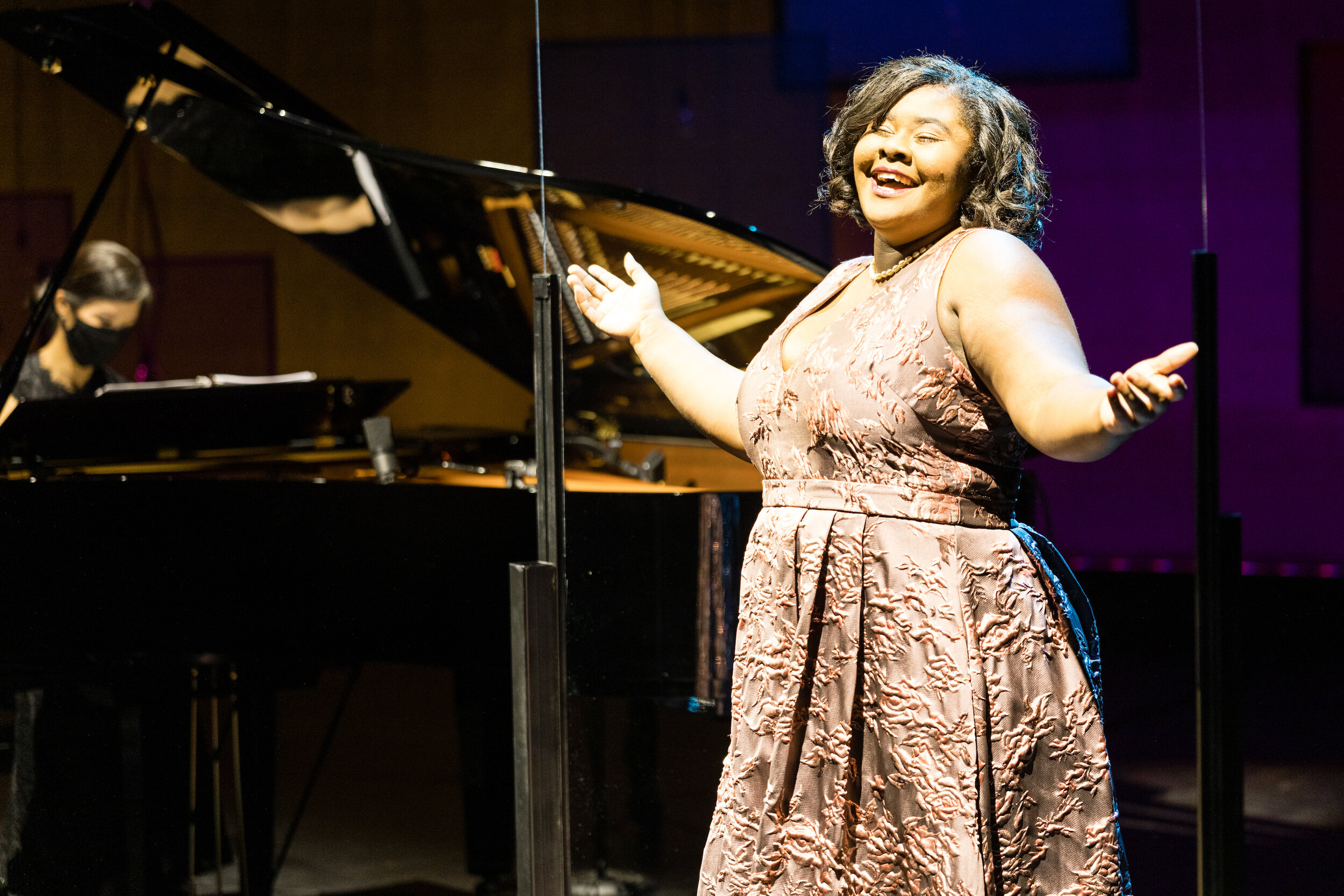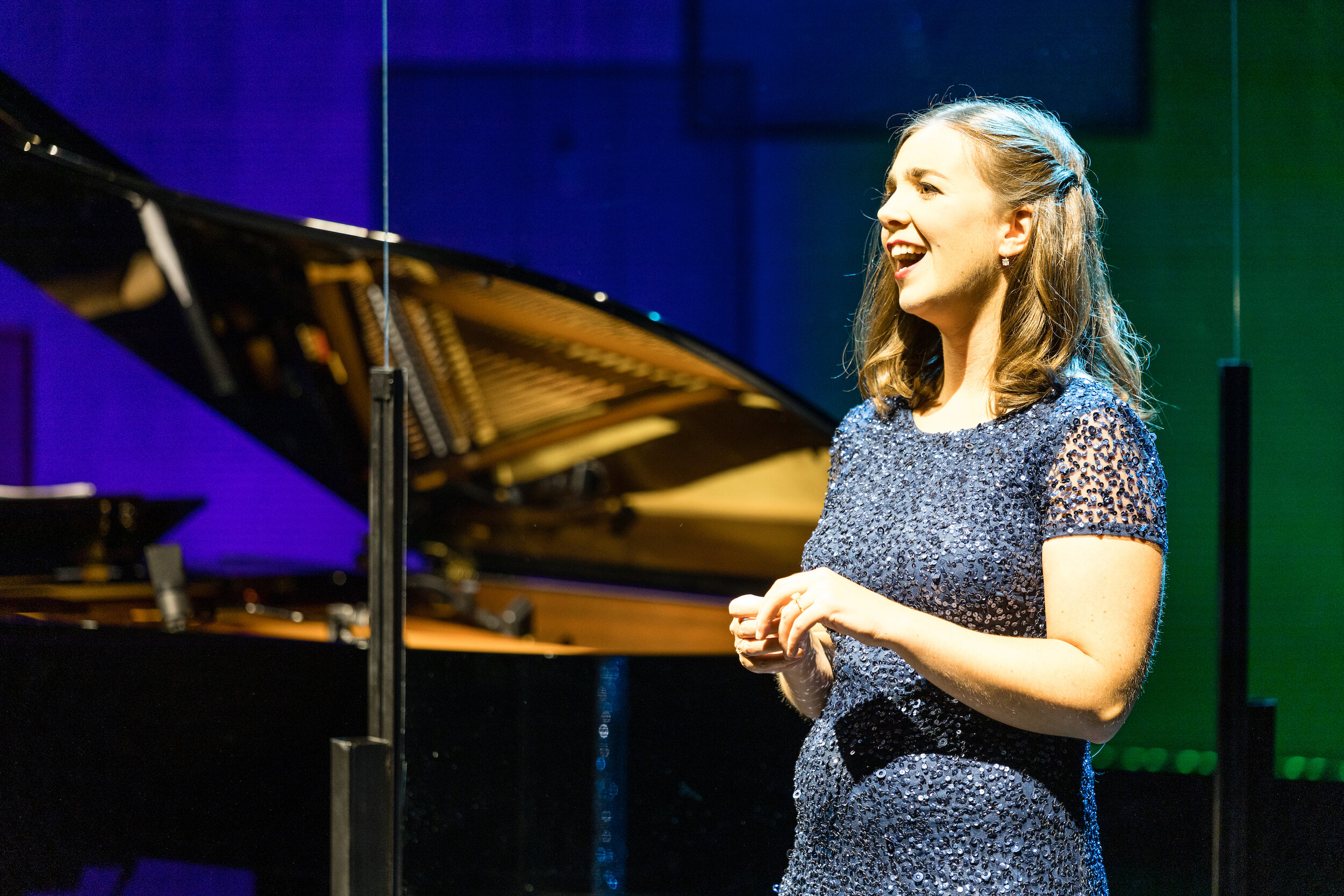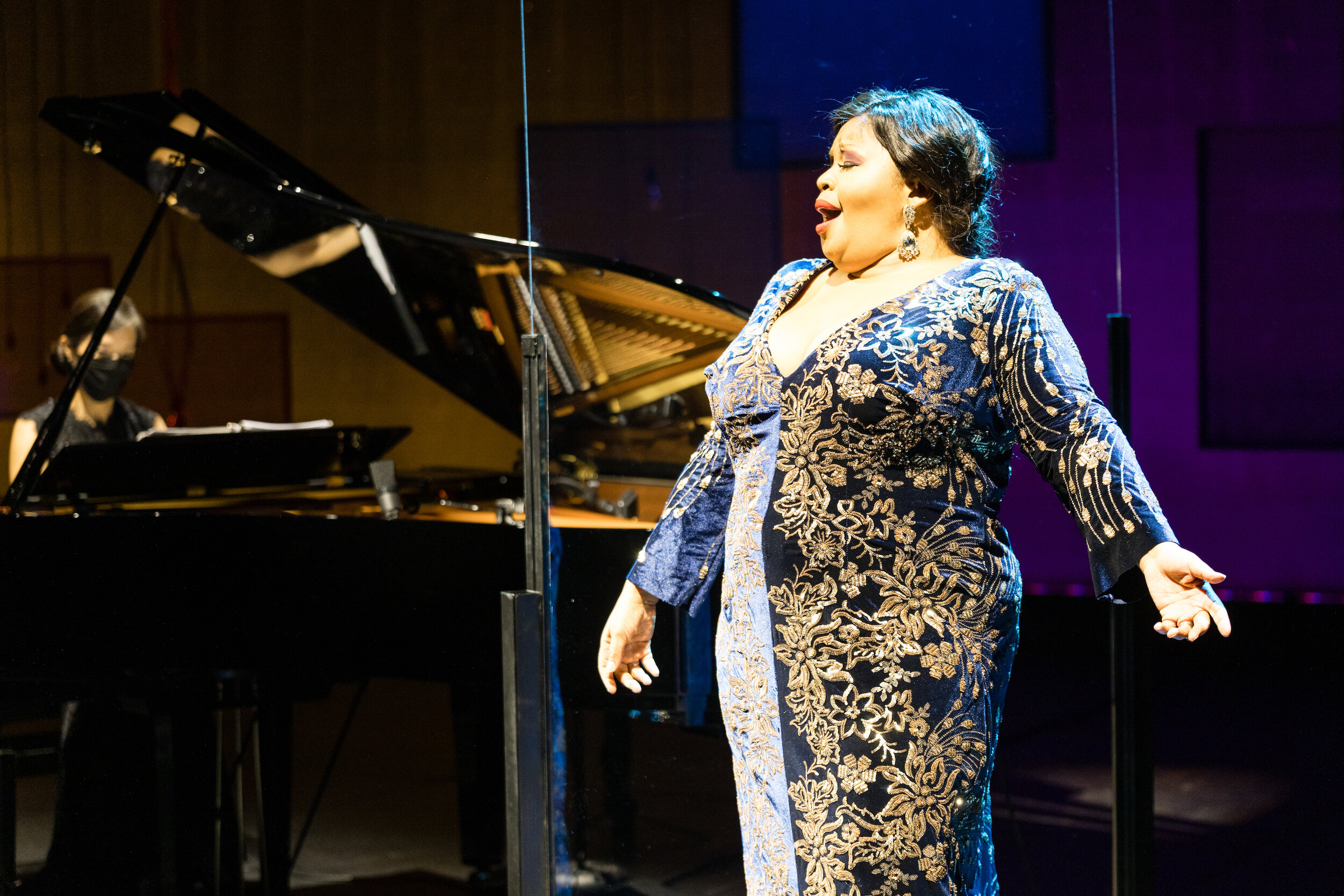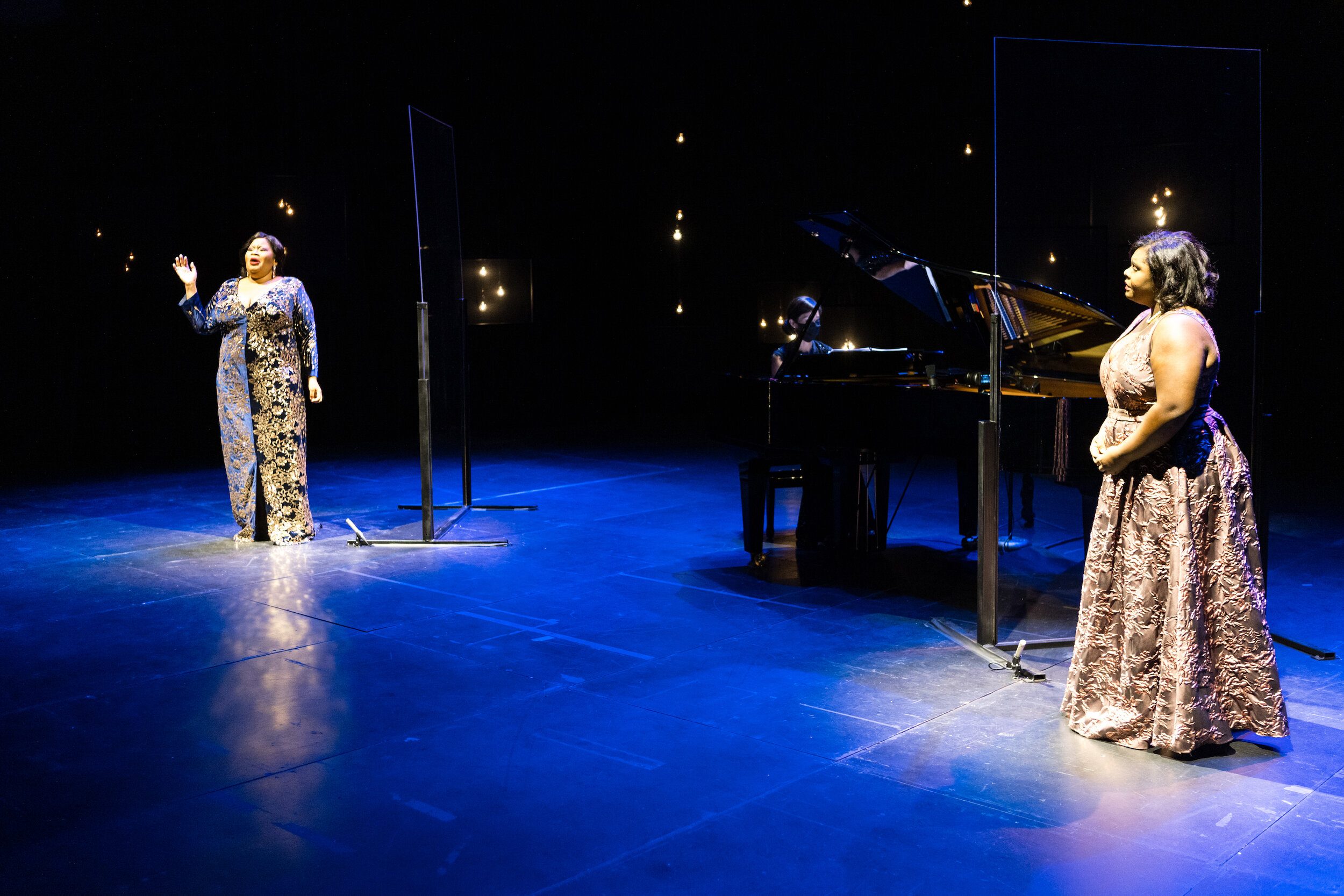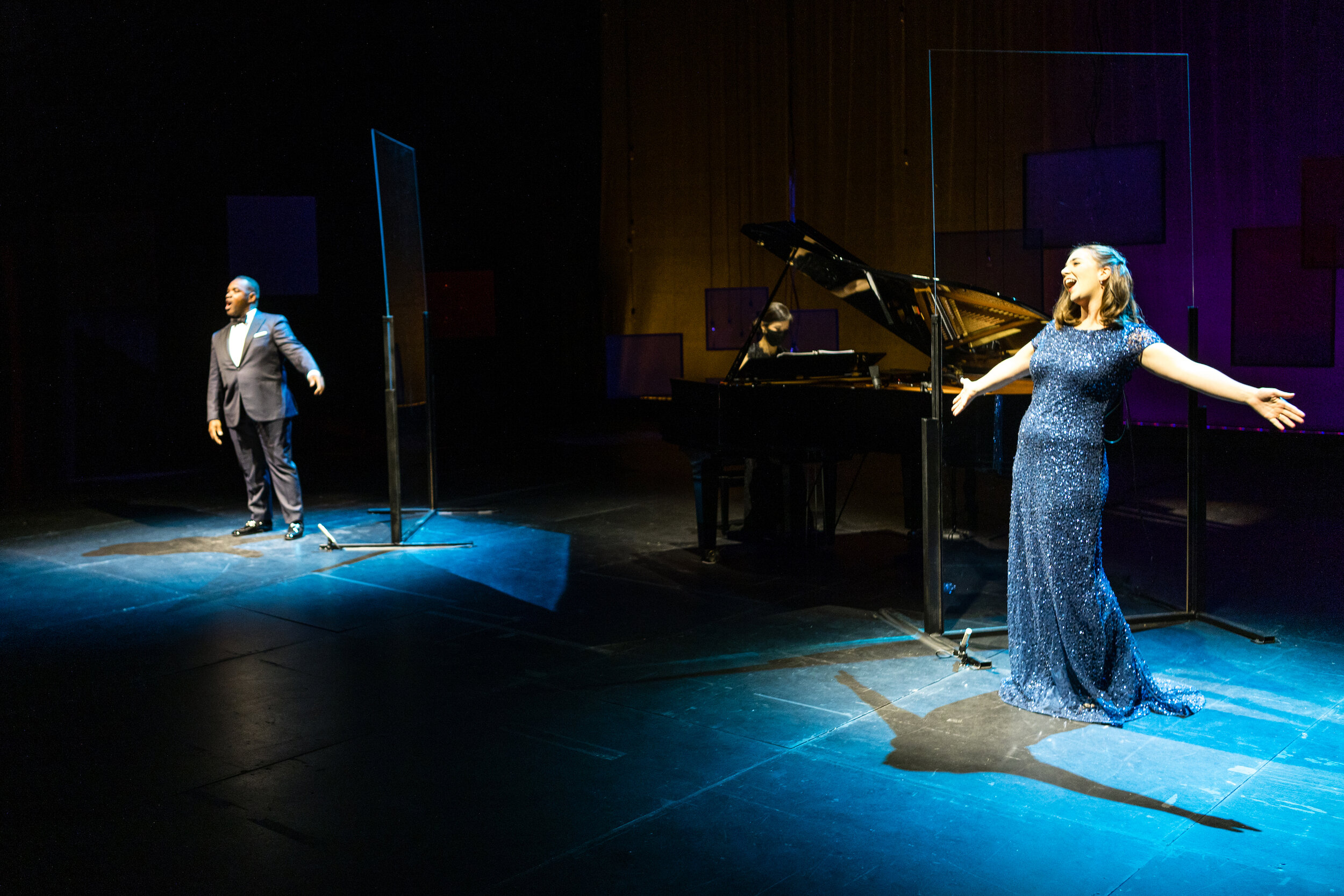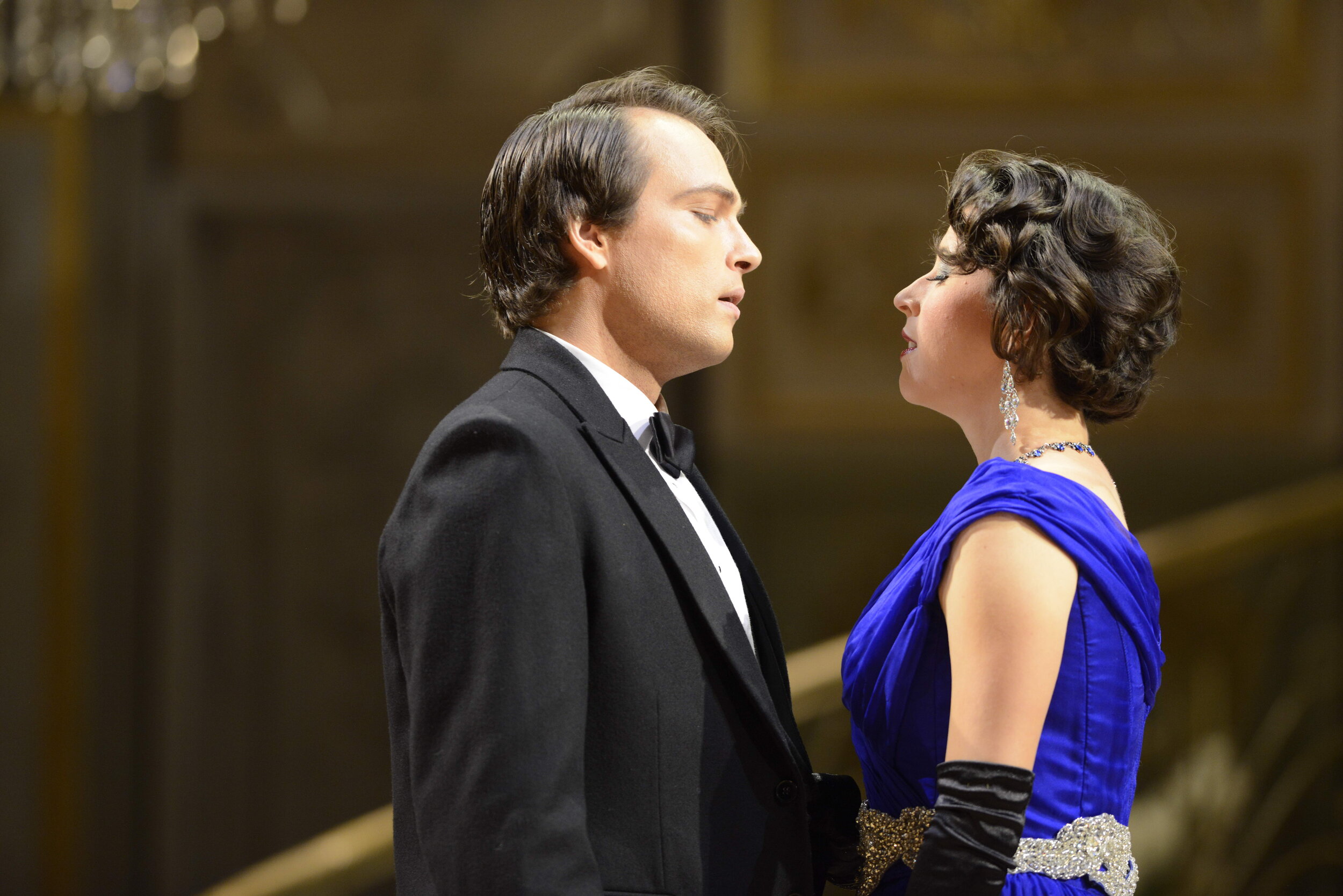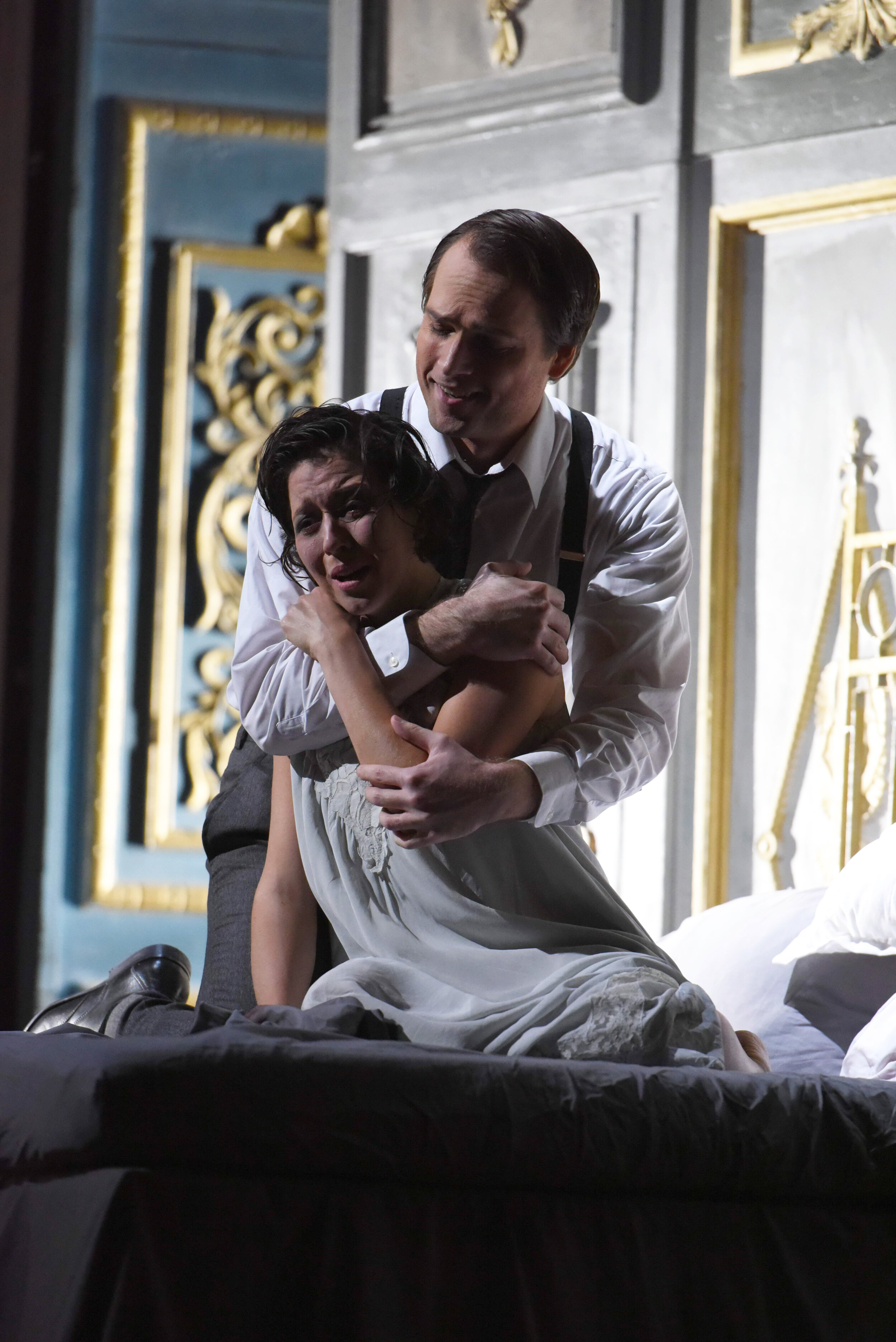Opera Philadelphia Channel logo; courtesy of Opera Philadelphia.
They could have named it Opera Philadelphia Anywhere; I watched from my sofa in Virginia. Opera Philadelphia Channel’s first three major events of their 2020-2021 season are now posted for viewing. What is Opera Philadelphia Channel? It’s like TV, only it’s a streaming service on the internet. It’s like PBS in that it offers high quality stuff, only just stuff by Opera Philadelphia, primarily events produced for showing on their channel since performing before audiences has been restricted by the pandemic. It’s like HBO Max in that all this season’s content is stored online for On Demand access as it is premiered; the videos can be viewed 24/7 on your smartphone, computer, or TV/streaming media player. The content will be available until the end of the 2020-2021 season in May. You can pay by event or purchase a season pass. My bottom line based on content posted thus far and that promised: OPC represents excellent value programming of strong interest to the opera fan.
Showing now:
“Lawrence Brownlee and Friends” – In a video recorded at the Wilma Theater in Philadelphia on September 16-18, superstar tenor Lawrence Brownlee trades stories with three excellent sopranos, Lindsey Reynolds, Sarah Shafer, and Karen Slack, and the marvelous pianist, Myra Huang, each masked during conversations and socially-distanced with intervening Plexiglas. Each singer performs solos with socially distanced duets also included, all accompanied by Ms. Huang.
La Traviata – A movie quality film of the 2015 Opera Philadelphia production where soprano Lisette Oropesa, now opera mega-star, made her debut in the role of Violetta. Supplementary videos, also available, include an extended conversation between Ms. Oropesa and Mr. Brownlee.
Cycles of Our Being – a 2018 song cycle recorded September 22-24 in the Wilma Theater. Composer and conductor Tyshawn Sorey, poet Terrance Hayes, tenor Lawrence Brownlee, clarinetist Alexander Laing, cellist Khari Joyner, violinist Randall Mitsuo Goosby, and pianist Myra Huang collaborate in an attempt to capture in music and song the inner life of being a black man in America.
Tenor Lawrence Brownlee. Photo by Dominic M. Mercier; courtesy of Opera Philadelphia.
Lawrence Brownlee deserves his own television show and why not on OPC? He is talented, respected, amiable, and has a large cadre of friends in the business. He actively advocates for racial equality using his podium as an opera singer. He sings magnificently and carries substantial name recognition. Other opera talents readily work with him. Right now, Opera Philadelphia Channel has got him; he is an artistic advisor for OP. For those in my generation, I might call him the Perry Como of opera singers on the one hand and opera’s Harry Belafonte on the other. Whatever he does is must see…and hear.
left to right: Sopranos Lindsey Reynolds, Sarah Shafer, and Karen Slack. Photos by Dominic M. Mercier; courtesy of Opera Philadelphia.
The Perry Como side of Mr. Brownlee comes forth in the recital “Lawrence Brownlee and Friends”. Amiable, warm hearted chit chat with three engaging sopranos, well known to fans of Opera Philadelphia and the I-95 corridor, reveals the human side of divas, and each gets the opportunity to display their operatic prowess singing several solos, including arias, lieder, popular songs, and spirituals. I watched this twice; it was a lot to take in, and I liked it even more on the second viewing. Ms. Huang and Mr. Brownlee collaborated on the program; she said they selected lighter, popular pieces for the program, and he added that celebrating women in opera was also a goal.
Socially-distanced duets in “Lawrence Brownlee and Friends”: left to right, sopranos Slack and Reynolds, tenor Brownlee and soprano Shafer. The pianist in both photos is Myra Huang. Photos by Dominic M. Mercier; courtesy of Opera Philadelphia.
Some of it was light fare, but not all. Ms. Huang arranged the heart rendering spiritual “Watch and Pray” to be sung as a duet between sopranos Reynolds in the role of daughter and Slack in the role of mother; they portray slaves in a scene where the daughter is to be sold the next morning. The contrasting fun side comes out in the clever lyrics given to a performance where Mr. Brownlee challenges each of the sopranos with a round of “Anything you can do I can do better”. He loses; we all win. His vocals are all standouts; it is fun to hear a bel canto master sing opera, spirituals, and popular tunes (one up for Mr. Brownlee; I don’t think Perry Como ever tried opera). Each of the singers is delightful, all performing songs, arias, and spirituals. Ms. Huang deserves special mention. She is a highly accomplished accompanist and plays the piano with such feeling and deft touch that she almost steals the show. (Note to OP: why not give us a chance to hear her perform solo? Give me an Old Fashioned, and I will sit and listen to her all night.). Sarah Shafer, who credits Mr. Brownlee with inspiring her to sing opera, has a beautiful voice; it was fun to hear her sing some snappy Gershwin, and then display a lovely low register in “Deep River’, a Marian Anderson signature spiritual. Lindsey Reynolds is a young professional who sings beautifully and talks with Mr. Brownlee about being an up-and-coming singer. Ms. Slack talks about being a Philadelphia girl and knocked my socks off with everything she sang; I will definitely be looking for her performances in the future.
Speaking of sopranos, let’s talk about Lisette Oropesa. She first caught my attention a few years back in supporting roles with Met Opera. I had the good fortune to see her live twice in the past year, once with Pittsburgh Opera and once with Washington Concert Opera. Before that she spent several years mainly in Europe further developing her talent. Now, she is a regular headliner at the Met. And let’s talk about Giuseppe Verdi’s La Traviata, the story of a young courtesan who finds love just before she loses her life. I think it is the perfect opera, a compelling human story and gorgeous music and arias intertwined with the story from beginning to end; the entire opera flows like a single song. I’ve actually been listening to recordings of this opera a lot during the pandemic. Nothing seems to connect me to what I need from opera and what I’m missing now like La Traviata does.
Soprano Lisette Oropesa as Violetta in Opera Philadelphia’s 2015 La Traviata. Photo by Kelly & Massa; courtesy of Opera Philadelphia.
Surprisingly, Ms. Oropesa was not sure this role was for her which she revealed in her interview with Mr. Brownlee, but she was encouraged by her trainer, the great soprano Renata Scotto, to take it on. Her singing and the beauty of her voice shine in this production; that I expected. What also impressed me was her acting ability and her stage presence in the role of Violetta. Every nuanced expression and movement supports the scene. She seems born for the stage. These qualities work beautifully for her in close ups that filming provides. In addition to supporting roles, there are two other principal roles: Tenor Alek Shrader gives a fine performance as her young lover, Germont, and bass baritone Stephen Powell as his father gives possibly the best portrayal of the senior Germont that I have seen. Mr. Powell is stellar in voice and role playing in every scene in which he appears.
left to right: Tenor Alek Shrader as Alfredo Germont and soprano Lisette Oropesa as Violetta early in their romance and near the end. Photo by Kelly & Massa; courtesy of Opera Philadelphia.
Under the direction of Paul Curran, the flow of the opera is well paced to highlight the drama. The music supplied by the OP Orchestra under the baton of Conductor Corrado Rovaris also supports that flow and adds to the beauty of the production, though I wish the volume had been turned up just a tad for the opening overture. The choruses are also a delight. I especially enjoyed the women’s chorus in a party scene. Kudos to Chorus Master Elizabeth Braden. This is a classical production with an impressive set and costumes; it all works.
Soprano Lisette Oropesa as Violetta listening to Giorgio Germont’s plea for her to relinquish her relationship with his son. Photo by Kelly & Massa; courtesy of Opera Philadelphia.
The filming of OP’s La Traviata deserves special mention. Kudos to Bruce Bryant, who directed the video capture in 2015 for a free outdoor “Opera on the Mall” broadcast at Independence Mall. The angles, framing, and close ups enhance the audience’s immersion in the drama. I felt more like I was watching a movie than a video of a staged opera, edging me closer to an in-theater experience. In Violetta’s bedroom death scene, I had the feeling I was in the room. The audio quality of the video is excellent; the OPC team remixed the audio in September to prime it for streaming. It is easy to see why OP chose this video for early placement in their offerings. It shines.
Composer/conductor of Cycles of My Being, Tyshawn Sorey. Photo by Dominic M. Mercier; courtesy of Opera Philadelphia.
The most recent program on the Opera Philadelphia Channel is the song cycle “Cycles of My Being” by composer Tyshawn Sorey with a libretto by Terrance Hayes and Mr. Brownlee based on poems by Hayes. Sorey, Brownlee, musicians Goosby, Huang, Joyner, and Laing enter the foggy, spotlight lit stage dressed in black, Goosby and Joyner in hoodies. The proceedings are serious and barren, almost grim. The work was born of Mr. Brownlee’s desire to have a conversation with America about what it means to be a black man in America. An early lyric says “America, do you care for me as I care for you, do you love the air in me as I love the air in you” expressing rejection, pain, and loneliness. There are six parts to the song cycle, each expressing different moods and sentiments. The music speaks as well as the poetry. In part V, the clarinet literally screams for attention, in Mr. Laing’s view, testifying to anguish. The music has melodies, but also dissonance creating a dreamscape that fits the inner turmoil being expressed, perhaps somewhat reminiscent of Benjamin Britten’s Billy Budd, just to give you an idea. The music is as expressive as the poetry, and the poetry speaks loudly – “when hunted, hope is a knife”; “hate is subtle”; “you nor I were born with hate”. “Cycles of My Being” is engaging and enhances understanding. The music holds onto you, but it’s grasp is not a place you would want to live. Why do we cause others to live there?
Cycles of My Being: violinist Randall Mitsuo Goosby, cellist Khari Joynerr, pianist Myra Huang, and tenor/librettist Lawrence Brownlee. Photo by Dominic M. Mercier; courtesy of Opera Philadelphia.
There is an accompanying video titled “Post Performance Conversation”, a discussion of “Cycles of My Being” that is worthwhile viewing. The decision was made to include only the five black men performers for a discussion of the song cycle and what it means to be a black man in America. Each performer talks about how they approached the music, and one highlight for me was Mr. Sorey discussing how he approached creating the music, and how his method was different for this piece. They discuss how their choice of careers in classical music, a European artform that does not address the black experience, has to a degree separated them from the black community. Each discussant, even with their shared experiences of racial prejudice, comes across as an individual, an important message in itself.
Upcoming productions, with dates of availability:
December 11 - “Love in the Park”, a five-episode series from a Sept. 30 chorus concert held in Dilworth Park next to Philadelphia City Hall, in which 16 singers of the Opera Philadelphia Chorus under the direction of Chorus Master Elizabeth Braden perform popular opera arias and choruses as well as musical theater selections, accompanied by pianist Grant Loehnig.
January 8 to 15 only (free to evrryone) – “Bon Appétit! A Sweet Soirée”; a digital fund-raising event that includes a showing of the production by Houston Grand Opera of the short opera Bon Appétit! by Lee Hoiby, featuring soprano Jamie Barton as Julia Child. A menu of gustatory benefits will be offered to supporters of Opera Philadelphia.
January 22 – Soldier Songs by David T. Little; a one-man opera featuring Johnathan McCullough as performer and director. “Based on interviews with veterans of five wars, the piece combines elements of theater, opera, rock-infused concert music, and animation to explore the perceptions versus the realities of the Soldier…”.
Coming soon – El Cimarrón by Hans Werner Henze; the true story of a Cuban born into slavery, who as a young man, escaped bondage on a sugar plantation, survived in the jungle, fought for Cuban independence, and lived to tell about it before dying at the age of 113, portrayed by bass-baritone Sir Willard White, supported by a guitarist, a flautist, and a percussionist.
Spring 2021 – “Digital Commissions”; Opera Philadelphia has commissioned four composers, Tyshawn Sorey, Courtney Bryan, Angélica Négron, and Caroline Shaw to create and premiere new works to be streamed on the Channel, beginning with a work by Mr. Sorey expected to begin in January. Pleasingly remarkable for inclusion of three women composers, this could be the most exciting event of all!
Additional works are under consideration, both free and for purchase, to be added during the current season; so, content on the Channel will continue to grow into April.
With the creation of Opera Philadelphia Channel, Opera Philadelphia again leaps ahead in opera leadership in the U.S., a trend that began with its forward-thinking OP Festival series of the last few years. By putting its words into action, OP has also moved strongly towards addressing a critical issue facing opera today, racial and gender equity. I suspect it is onto something, or maybe online to something. I still maintain there is nothing like live opera experienced in the opera house and long for its return, but I can’t ignore my young son’s recent comment to me that while he likes attending opera, the preference for being there is not as important to him as it is to me. OP realizes that online performances are here to stay, especially with the digital generation. I suspect that if there is a growth audience for opera, it will manifest primarily online. Though the Opera Philadelphia Channel was made necessary by the pandemic, OP is already planning a new season for the Channel to run concurrently with live, in-house performances when they are again possible.
For now, Opera Philadelphia Channel is our only Opera Philadelphia option, but they have made it a good option, one of our best for new, authentic arts experiences viewed online.
The Fan Experience: Opera Philadelphia Channel is set up for events to be viewed separately with prices in the $10-25 range for viewing On Demand for seven days, or for a $99 subscription, all events are available On Demand through May 2021. Free event previews are offered. Subtitles in English can be accessed via the settings icon on the videos. The video and sound quality as well as ease of use has been excellent for the events I have watched. The 24/7 access is a blessing. There were a couple of minor fan bumps in the road for me: white subtitles in La Traviata were sometimes washed out by the background, and transitions between acts need attention to prepare audiences for the shifts in the story. “Friends” might have benefited from a director, especially transitions which could have been smoother. Nothing major. The full program list for “Lawrence Brownlee and Friends” can be found here.
In addition to the main offerings, supplementary videos are posted for most of the events. Also, many of OP’s free events can be accessed readily through its Channel. A notable free feature not mentioned above is “Reflection & Re-vision”, a series of lectures and discussions on elements of opera; the two current offerings are titled “Misled Transformation of a Heroine” and “Reimagine the Opera Canon”.
I am by no means tech savvy, but I have watched events on my MacBook Air and on my large screen TV using Apple TV and the Opera Philadelphia app with no difficulty accessing content. There is an OP webpage addressing questions about streaming. And, if you require help of a live person, OP’s guest services team is among the most helpful I have encountered. At the bottom of the Opera Philadelphia website there is a telephone number and email address for guest services and a Chat Now button that makes for easy contact.



